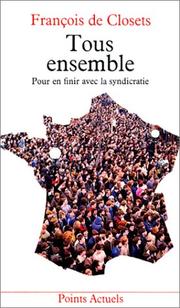| Listing 1 - 10 of 72 | << page >> |
Sort by
|
Book
ISBN: 2704000042 9782704000043 Year: 1973 Publisher: Paris Doin
Abstract | Keywords | Export | Availability | Bookmark
 Loading...
Loading...Choose an application
- Reference Manager
- EndNote
- RefWorks (Direct export to RefWorks)
France --- Economic conditions --- Social conditions --- France - Economic conditions - 1945 --- -France - Social conditions - 1945 --- -France
Book
ISBN: 9782707188847 9782707188847 2707188840 2707188840 Year: 2021 Publisher: 18-Saint-Amand-Montrond: [Paris]: Impr. CPI Bussière, La Découverte Poche,
Abstract | Keywords | Export | Availability | Bookmark
 Loading...
Loading...Choose an application
- Reference Manager
- EndNote
- RefWorks (Direct export to RefWorks)
Comme il était doux le temps des " Trente Glorieuses " ! La démocratisation de la voiture et de la viande ! L'électroménager libérant la femme ! La mécanisation agricole éradiquant la famine ! La Troisième Guerre mondiale évitée et la grandeur nationale restaurée grâce à la dissuasion nucléaire ! Etc. Telle est aujourd'hui la vision dominante de cette période d'" expansion ", objet d'une profonde nostalgie passéiste... au risque de l'aveuglement sur les racines de la crise contemporaine. À rebours d'une histoire consensuelle de la modernisation, cet ouvrage dévoile l'autre face, noire, du rouleau compresseur de la " modernité " et du " progrès ", qui tout à la fois créa et rendit invisibles ses victimes : les irradié.e.s des essais nucléaires en Algérie et en Polynésie, les ouvrier.ère.s de l'amiante ou des mines d'uranium contaminé.e.s, les rivières irrémédiablement polluées, les cerveaux colonisés par les mots d'ordre de la " croissance " et de la publicité... Il nous faut donc réévaluer la période et faire resurgir la voix des vaincu.e.s et des critiques du " progrès " (de l'atome, des pollutions, du productivisme et du consumérisme) antérieures à 1968. L'enjeu est non seulement de démonter les stratégies qui permirent alors de les contourner, mais aussi de les réinscrire dans les combats politiques et écologiques contemporains
Book
ISBN: 2717810900 9782717810905 Year: 1986 Publisher: Paris Economica
Abstract | Keywords | Export | Availability | Bookmark
 Loading...
Loading...Choose an application
- Reference Manager
- EndNote
- RefWorks (Direct export to RefWorks)
Cooperation --- Mutualism --- France --- Economic conditions --- Prévision économique --- Économie sociale --- Cooperation - France --- Mutualism - France --- France - Economic conditions - 1945 --- -Cooperation - France --- -Cooperation

ISBN: 202009486X 9782020094863 Year: 1985 Volume: 79 Publisher: Paris Seuil
Abstract | Keywords | Export | Availability | Bookmark
 Loading...
Loading...Choose an application
- Reference Manager
- EndNote
- RefWorks (Direct export to RefWorks)
Syndicalisme --- --France --- --Société --- France --- Economic conditions --- Social conditions --- #gsdbS --- Société --- France - Economic conditions - 1945 --- -France - Social conditions - 1945-1995
Periodical
ISSN: 03361470 Year: 1969 Publisher: Paris
Abstract | Keywords | Export | Availability | Bookmark
 Loading...
Loading...Choose an application
- Reference Manager
- EndNote
- RefWorks (Direct export to RefWorks)
Income --- France --- FR / France - Frankrijk --- Published Quarterly --- Periodicals --- Economic conditions --- Social conditions --- France - Economic conditions - 1945-. --- France - Social conditions - 1945-1995.
Book
ISBN: 2020048566 9782020048569 Year: 1978 Publisher: [Paris]: Seuil,
Abstract | Keywords | Export | Availability | Bookmark
 Loading...
Loading...Choose an application
- Reference Manager
- EndNote
- RefWorks (Direct export to RefWorks)
History --- Politics --- History of France --- Riots --- France --- Economic conditions --- Social conditions --- Riots - France - Paris --- France - Economic conditions - 1945 --- -France - Social conditions - 1945 --- -Riots

ISBN: 2903463077 9782903463076 Year: 1990 Publisher: Paris : Sciences et techniques humaines,
Abstract | Keywords | Export | Availability | Bookmark
 Loading...
Loading...Choose an application
- Reference Manager
- EndNote
- RefWorks (Direct export to RefWorks)
France. --- European Court of Human Rights --- France --- Social policy --- Economic conditions --- France - Social policy --- France - Economic conditions - 1945 --- -France. --- -France - Social policy --- -France --- European Court of Human Rights.

ISBN: 2858020876 9782858020874 Year: 1979 Publisher: Paris : Editions L'Harmattan,
Abstract | Keywords | Export | Availability | Bookmark
 Loading...
Loading...Choose an application
- Reference Manager
- EndNote
- RefWorks (Direct export to RefWorks)
Rural development --- Industrial location --- Industrial relations --- France --- Economic conditions --- Rural development - France --- Industrial location - France --- Industrial relations - France --- France - Economic conditions - 1945 --- -Rural development --- FRANCE --- PAYSANNERIE --- OUVRIERS
Book
ISBN: 2227356049 9782227356047 Year: 1979 Publisher: (Paris) : Le Centurion,
Abstract | Keywords | Export | Availability | Bookmark
 Loading...
Loading...Choose an application
- Reference Manager
- EndNote
- RefWorks (Direct export to RefWorks)
Book
ISBN: 9780674976412 067497641X Year: 2018 Publisher: Cambridge, Massachusetts ; London, England : Harvard University Press,
Abstract | Keywords | Export | Availability | Bookmark
 Loading...
Loading...Choose an application
- Reference Manager
- EndNote
- RefWorks (Direct export to RefWorks)
At the end of World War II, France's greatest challenge was to repair a civil society torn asunder by Nazi occupation and total war. Recovery required the nation's complete economic and social transformation. But just what form this "new France" should take remained the burning question at the heart of French political combat until the Algerian War ended, over a decade later. Herrick Chapman charts the course of France's long reconstruction from 1944 to 1962, offering fresh insights into the ways the expansion of state power, intended to spearhead recovery, produced fierce controversies at home and unintended consequences abroad in France's crumbling empire. Abetted after Liberation by a new elite of technocratic experts, the burgeoning French state infiltrated areas of economic and social life traditionally free from government intervention. Politicians and intellectuals wrestled with how to reconcile state-directed modernization with the need to renew democratic participation and bolster civil society after years spent under the Nazi and Vichy yokes. But rather than resolving the tension, the conflict between top-down technocrats and grassroots democrats became institutionalized as a way of framing the problems facing Charles de Gaulle's Fifth Republic. Uniquely among European countries, France pursued domestic recovery while simultaneously fighting full-scale colonial wars. France's Long Reconstruction shows how the Algerian War led to the further consolidation of state authority and cemented repressive immigration policies that now appear shortsighted and counterproductive.--
| Listing 1 - 10 of 72 | << page >> |
Sort by
|

 Search
Search Feedback
Feedback About UniCat
About UniCat  Help
Help News
News